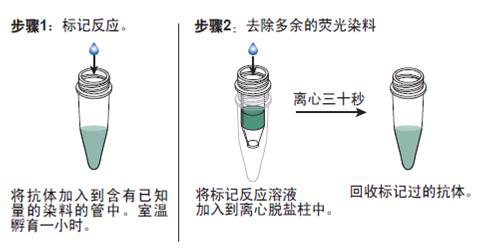
|

| 产地 | 进口、国产 |
| 品牌 | 上海莼试 |
| 保存条件 | Store at -20 °C |
| 货号 | CS9919 |
| 应用范围 | WB=1:100-500 ELISA=1:500-1000 IP=1:20-100 IHC-P=1:100-500 IHC-F=1:100-500 IF=1:100-500 |
| CAS编号 | |
| 抗体名 | Anti-SLC12A3/NCCT |
| 克隆性 | |
| 靶点 | 详见说明书 |
| 适应物种 | 详见说明书 |
| 形态 | 详见说明书 |
| 宿主 | 详见说明书 |
| 亚型 | IgG |
| 标识物 | 详见说明书 |
| 浓度 | 1mg/1ml% |
| 免疫原 | KLH conjugated synthetic peptide derived from human SLC12A3/NCCT |
产品订购信息:
英文名称 Anti-SLC12A3/NCCT
中文名称 钠氯离子转运蛋白抗体品牌
别 名 Na Cl symporter; Na-Cl symporter; NaCl electroneutral thiazide sensitive cotransporter; NCCT; S12A3_HUMAN; slc12a3; Solute carrier family 12 (sodium/chloride transporters) member 3; Solute carrier family 12 member 3; Thiazide sensitive Na Cl cotransporter; Thiazide sensitive sodium chloride cotransporter; Thiazide-sensitive sodium-chloride cotransporter; TSC.


浓 度 1mg/1ml
规 格 0.2ml/200μg
抗体来源 Rabbit
克隆类型 polyclonal
交叉反应 Human, Mouse, Rat, Dog, Cow, Rabbit
产品类型 一抗
研究领域 心 细胞生物 通道蛋白 转运蛋白
蛋白分子量 predicted molecular weight: 113kDa
性 状 Lyophilized or Liquid
免 疫 原 KLH conjugated synthetic peptide derived from human SLC12A3/NCCT
亚 型 IgG
纯化方法 affinity purified by Protein A
储 存 液 Preservative: 15mM Sodium Azide, Constituents: 1% BSA, 0.01M PBS, pH 7.4
钠氯离子转运蛋白抗体品牌 产品应用 WB=1:100-500 ELISA=1:500-1000 IP=1:20-100 IHC-P=1:100-500 IHC-F=1:100-500 IF=1:100-500
(石蜡切片需做抗原修复)
not yet tested in other applications.
optimal dilutions/concentrations should be determined by the end user.
保存条件 Store at -20 °C for one year. Avoid repeated freeze/thaw cycles. The lyophilized antibody is stable at room temperature for at least one month and for greater than a year when kept at -20°C. When reconstituted in sterile pH 7.4 0.01M PBS or diluent of antibody the antibody is stable for at least two weeks at 2-4 °C.
Important Note This product as supplied is intended for research use only, not for use in human, therapeutic or diagnostic applications.
产品介绍 Na-K-Cl cotransporters (NKCC) are channel proteins that aid in the transcellular movement of chloride across both secretory and absorptive epithelia. NKCC1 is expressed in muscle cells, neurons, and red blood cells. In the basolateral membrane of secretory epithelia, NKCC1 mediates active chloride secretion. The gene encoding human NKCC1 maps to chromosome 5q23.3. In mice, disruption of the NKCC1 gene leads to deafness and impaired balance. NKCC2 is specifically expressed in the kidney where it mediates active reabsorption of sodium chloride in the thick ascending limb of the loop of Henle. NKCC2 is sensitive to the clinically important diuretics furosemide and bumetanide. The gene encoding human NKCC2 maps to chromosome 15q15-q21 and mutations in this gene lead to Bartter’s syndrome, an inherited hypokalaemic alkalosis. NCCT is a thiazide-sensitive Na-Cl cotransporter that is primarily expressed in the distal convoluted tubule of the kidney where it accounts for a significant fraction of net renal sodium reabsorption. The gene for human NCCT map to chromosome 16q13. Mutations in the gene encoding NCCT cause Gitelman’s syndrome, a subset of Bartter’s syndrome.
Function : Electrically silent transporter system. Mediates sodium and chloride reabsorption.Subunit : Interacts with KLHL3.Subcellular Location : Membrane.Tissue Specificity : Predominant in kidney.Post-translational modifications : Ubiquitinated; ubiquitination is essential for regulation of endocytosis (By similarity). May be ubiquitinated by the BCR(KLHL3) complex.DISEASE : Defects in SLC12A3 are the cause of Gitelman syndrome (GS). GS is an autosomal recessive disorder characterized by hypokalemic alkalosis in combination with hypomagnesemia, low urinary calcium, and increased renin activity associated with normal blood pressure. Patients are often asymptomatic or present transient periods of muscular weakness and tetany, usually accompanied by abdominal pain, vomiting and fever. The phenotype is highly heterogeneous in terms of age at onset and severity. Cardinal features such as hypocalciuria and hypomagnesemia might also change during the life cycle of a given patient. GS has overlapping features with Bartter syndrome.Similarity : Belongs to the SLC12A transporter family.

IL-6(Interleukin-6) 白介素6(白细胞介素-6)(多肽抗原)Multi-class antibodies规格: 0.5mg
Anti-Phospho-CD19 (Tyr531) 磷酸化CD19抗体Multi-class antibodies规格: 0.1ml
Rhesus antibody Rh Pancreatic Amylase 胰淀粉酶抗体 规格 0.1ml
IL6R Kit Mouse 小鼠 IL6RA / CD126 ELISA配对抗体 ELISA
Trk A + B + C 英文名称: 酪酸激酶A/B/C抗体 0.1ml
FAT3 英文名称: 钙粘蛋白15抗体 0.2ml
Anti-Phospho-CD19 (Tyr531) 磷酸化CD19抗体Multi-class antibodies规格: 0.1ml
Beta-TG ELISA Kit 大鼠β血小板球蛋白/β环蛋白Multi-class antibodies规格: 48T
Anti-ADRB3/ Beta3-AR /FITC 荧光素标记能受体β3抗体IgGMulti-class antibodies规格: 0.2ml
Rhesus antibody Rh Fc γ RII a/CD32 免疫球蛋白G Fc段受体Ⅱ抗体 规格 0.1ml
APC(Mouse activated protein C) ELISA Kit 小鼠活化蛋白C 96T
MPS1 英文名称: 单极纺锤体蛋白激酶1抗体 0.2ml
ABLIM3 英文名称: 肌动蛋白结合蛋白LIM3抗体 0.2ml
Anti-ADRB3/ Beta3-AR /FITC 荧光素标记能受体β3抗体IgGMulti-class antibodies规格: 0.2ml
MMP-2/Gelatinase A(Human Matrix metalloproteinase 2/Gelatinase A) ELISA kit 人基质金属蛋白酶2/明胶酶AMulti-class antibodies规格: 48T
Anti-OPGL/ODF 骨保护蛋白配体抗体(破骨细胞分化因子)Multi-class antibodies规格: 0.1ml
Rhesus antibody Rh ICOS/CD278 诱导协同刺激分子CD278抗体 规格 0.2ml
PAI ELISA Kit 大鼠纤溶酶原激活物抑制因子 96T
Protamine 2 英文名称: 鱼精蛋白2抗体 0.2ml
C17orf74 英文名称: 17号染色体开放阅读框74抗体 0.2ml
Anti-OPGL/ODF 骨保护蛋白配体抗体(破骨细胞分化因子)Multi-class antibodies规格: 0.1ml
志贺氏菌增菌肉汤250g用于志贺氏菌的选择性增菌培养
Inorganicphosphorusbacteria
标准I号营养琼脂 Standard I Nutrient Agar 250 标准细菌计数、含糖(MERCK方法)
Letheen肉汤基础250g/瓶用于化妆品卫生微生物检测,每升培养基中需添加0204incubationmediaLetheen肉汤基础250g/瓶用于化妆品卫生微生物检测,每升培养基中需添加0204
OxfordAgarBase
乳糖胆盐培养基250g用于化妆品中粪大肠菌群的测定(GB标准)
菌种保存培养基 250(g) incubation media 菌种保存培养基 250(g)
TTC肉汤 ITC Broth 250克 分离培养耶尔森氏菌
M–肉汤250用于干燥食品和种子中沙门氏菌增菌培养(MERCK方法)incubationmediaM–肉汤250用于干燥食品和种子中沙门氏菌增菌培养(MERCK方法)
TetrathionateBrothBase
钠氯离子转运蛋白抗体品牌 Fraser肉汤增菌液FB1配套试剂 规格: 10支/盒 用途: 试剂A和试剂B各一支添加于225ml(026080)中配成FB1增菌液
李氏增菌液LB2冻干配套试剂 规格: 10支/盒 用途: 每支添加于200ml(026040)中配成LB2增菌液。
李氏增菌液LB1冻干配套试剂 规格: 10支/盒 用途: 每支添加于225ml(026040)中配成LB1增菌液。
EB增菌液冻干配套试剂 规格: 10支/盒 用途: 每支添加于225ml(026010)中配成EB增菌液

抗体的生物素化标记实验要点:
1. 钠氯离子转运蛋白抗体品牌 如在反应混合液中有叠氮钠或游离氨基存在,会抑制标记反应。因此,蛋白质在反应前要对 0.1mol/L碳酸氢钠缓冲液或0.5mol/L硼酸缓冲液充分透析;
2.所用的NHSB及待生物素化蛋白质之间的分子比按蛋白质表面的ε-氨基的密度会有所不同,选择不当则影响标记的效率,应先用几个不同的分子比来筛选最适条件;
3.用NHSB量过量也是不利的,抗原的结合位点可能因此被封闭,导致抗体失活;
4.由于抗体的氨基不易接近可能造成生物素化不足,此时可加入去污剂如 Triton x-100, Tween20等;
5.当游离ε-氨基(赖氨酸残基的氨基)存在于抗体的抗原结合位点时,或位于酶的催化位点时,生物素化会降低或损伤抗体蛋白的结合力或活性;
6.生物素还可能与不同的功能基团,如羰基、氨基、巯基、异咪唑基及*基,也可与糖基共价结合;
7.交联反应后,应充分透析,否则,残余的生物素会对生物素化抗体与亲和素的结合产生竞争作用;
8.在细胞的荧光标记实验中,中和亲和素的本底低,但由于链霉亲和素含有少量正电荷,故对某些细胞可导致高本底。
抗体的鉴定:
1)钠氯离子转运蛋白抗体品牌 抗体的效价鉴定:不管是用于诊断还是用于,制备抗体的目的都是要求较高效价。不同的抗原制备的抗体,要求的效价不一。鉴定效价的方法很多,包括有试管凝集反应,琼脂扩散试验,酶联免疫吸附试验等。常用的抗原所制备的抗体一般都有约成的鉴定效价的方法,以资比较。如制备抗抗体的效价,一般就采用琼脂扩散试验来鉴定。
2)抗体的特异性鉴定:抗体的特异性是指与相应抗原或近似抗原物质的识别能力。抗体的特异性高,它的识别能力就强。衡量特异性通常以交叉反应率来表示。交叉反应率可用竞争抑制试验测定。以不同浓度抗原和近似抗原分别做竞争抑制曲线,计算各自的结合率,求出各自在IC50时的浓度,并按公式计算交叉反应率。
如果所用抗原浓度IC50浓度为pg/管,而一些近似抗原物质的IC50浓度几乎是无穷大时,表示这一抗血清与其他抗原物质的交叉反应率近似为0,即该血清的特异性较好。
3)抗体亲和力:是指抗体和抗原结合的牢固程度。亲和力的高低是由抗原分子的大小,抗体分子的结合位点与抗原决定簇之间立体构型的合适度决定的。有助于维持抗原抗体复合物稳定的分子间力有氢键,疏水键,侧链相反电荷基因的库仑力,范德华力和空间斥力。亲和力常以亲和常数K表示,K的单位是L/mol。抗体亲和力的测定对抗体的筛选,确定抗体的用途,验证抗体的均一性等均有重要意义。